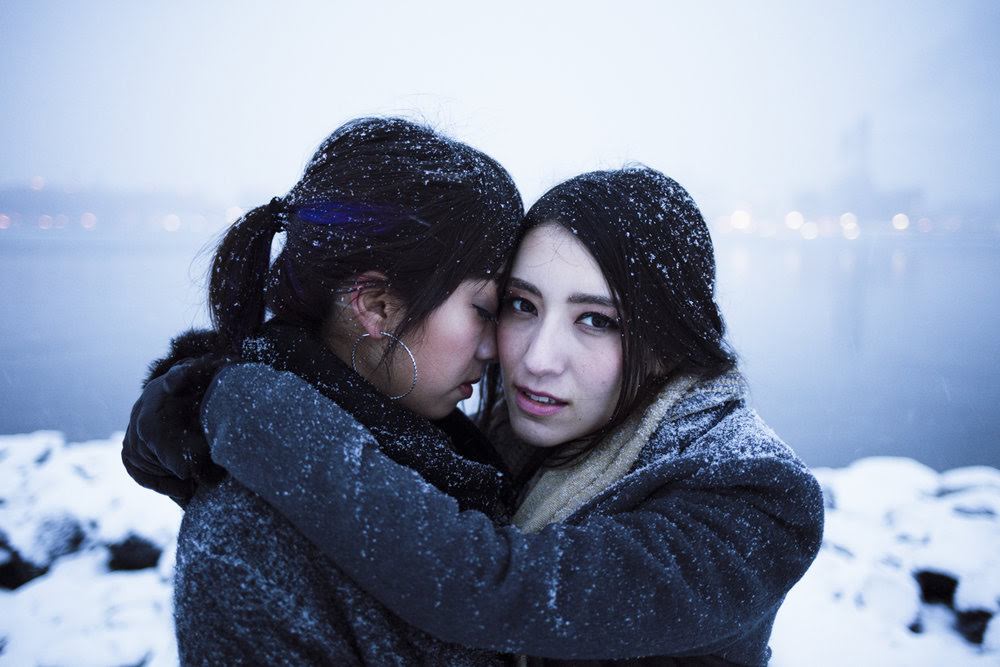Photographer and director An Rong Xu loves to depict couples in love, but he says it’s not entirely his choice. He’s photographed a couple breaking up on his roof, couples smooching all over each other in clubs. “The universe brings me to them,” he insists.
Xu was born in Taishan, China and moved with his mother at age 2 to join his father on Mulberry Street in Manhattan’s Chinatown. He grew up in a period he describes as “the era of rom-com.”
“I’m a hopeless romantic,” he says. “I think my generation grew up so obsessed with this idea of imagery and the idea of how we would look within movies.” And yet, as an Asian American man, he didn’t see himself represented in the movies he so loved. His series of romantic photos of Asian Americans and Asian communities abroad—in Seoul, Taiwan, China—are a conscious effort to depict what was absent for him growing up: Asian communities as romantic, sexual and intimate. A part of Xu’s work with Asian Americans is currently on exhibit at Interior Lives at the Museum of the City of New York through March 24, 2019. We caught up with Xu to talk about photographing romance, dating in New York, and sexuality as an Asian American man.
How did you become a photographer?
I went to Brooklyn Tech in the city. It’s a specialized high school where you have to take a test to get in. What’s special is we actually have to choose majors. I chose Media and Communications, and I got into photography that way.
With regards to knowing when photography was my passion, my second year in art school, I started doing a project on my grandfather. My grandfather raised me for the most part. In 2008 he was diagnosed with throat cancer. I hit this point where I needed to figure out what I want to do and I resolved to work with my grandfather. I dedicated myself to learning about him, our family history. I had no idea who he was.
I would spend time photographing him over and over again. This work evolved into something — for me, I explain this as my Spiderman moment.
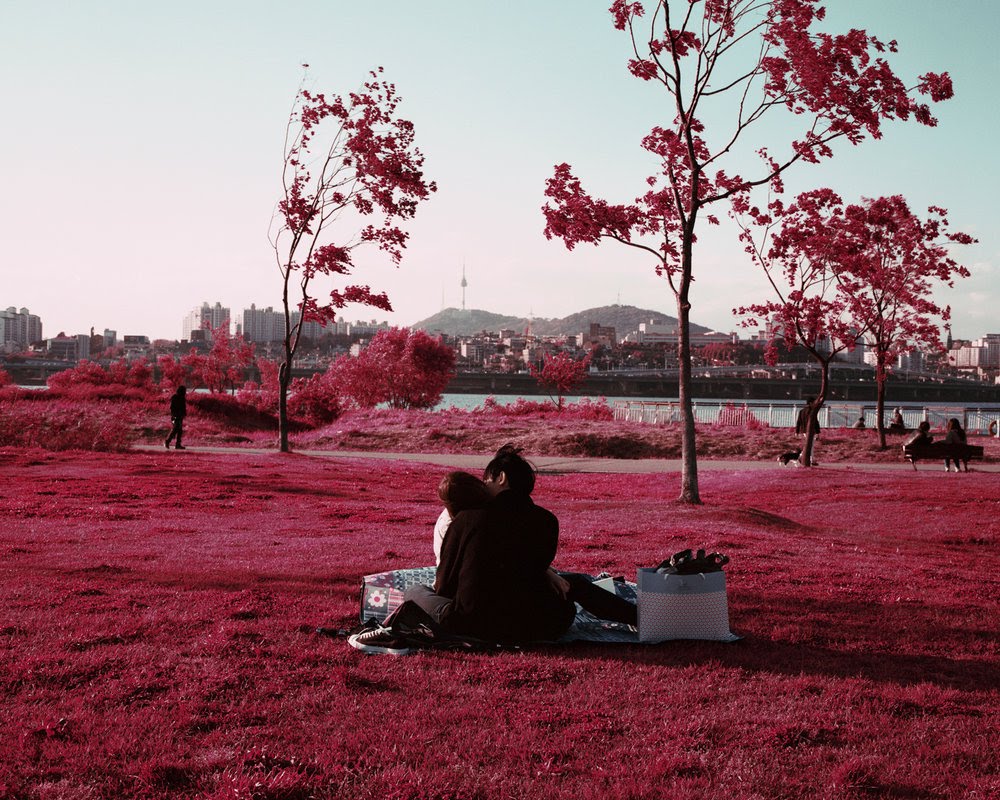
What do you mean by your Spiderman moment?
The moment you discover what you were meant for in life. So Peter Parker was not Spiderman the moment he got bitten by the spider, he was Spiderman the moment he watched Uncle Ben die in his arms, because he could have been the guy to stop the guy who killed Uncle Ben. He didn’t realize what he was meant for until something was at stake and it made him realize: I need to use my ability for this, and use my powers to help the world.
For me, my Spiderman moment happened with my grandfather. I spent 4 years photographing him. I slowly, contemplatively, made pictures of him and made them better and learnt how to create emotions and stories without saying any words.
Has photographing Asian Americans created a niche for you in your career?
I was working as a photo intern at TIME magazine then I started getting assignments with the New York Times. My Chinese American work is separate; it’s my passion project. That’s what I hope to finish when I die, and I hope that people realize it has some value, that it contributes to the idea of the American people beyond just black and white. For me, it’s a visual litany of American people; I don’t even want to say Chinese American people anymore, the idea is so absurd, it’s like we’ve been absorbed into the culture.
My own personal work hasn’t made me that much money, but you have to work on a project that interests people, so they’ll hire you to shoot their photos in that style. I would get hired to shoot portraits because people like my Chinese American work and want me to recreate that feeling for them.
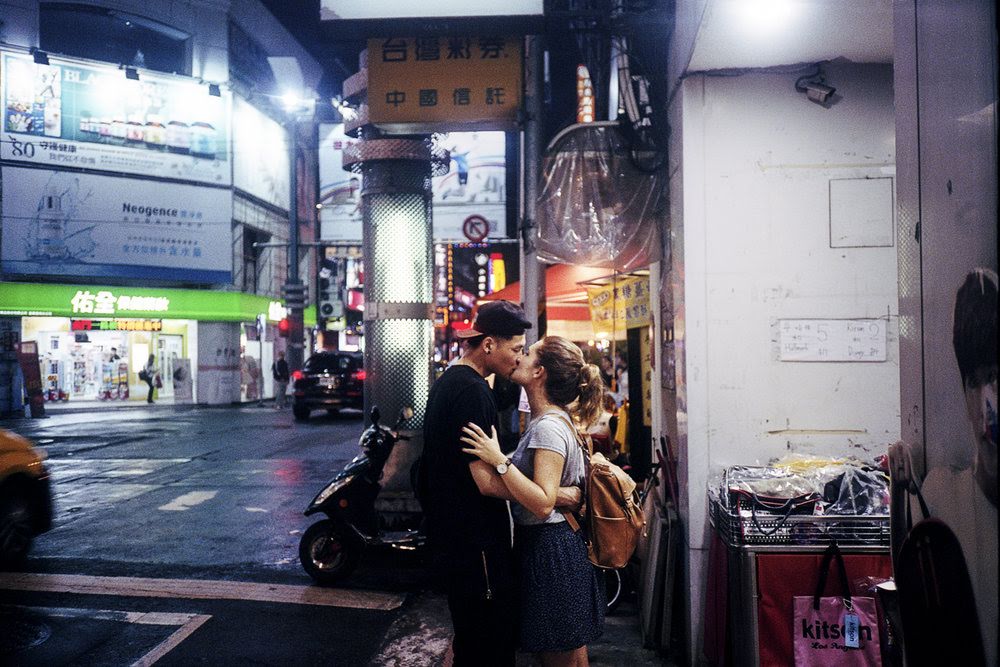
Who are your photography idols?
One of my favorite photographs is by Nobuyoshi Araki, and it is a photograph of his wife. You can feel she’s completely naked in front of him. I hope I’m able to create photographs where people are fully clothed but feel so completely naked.
I see that in your videos, you like to photograph Asian American communities in a very romantic way as well. Is that how you see the world?
I would categorize myself as a hopeless romantic. I’m very interested in relationships between people, how we’re shaped by our relationships. I’m drawn to stories of loneliness and how we cope with our loneliness.
Why is it still so rare to see Asian Americans in love?
In America, we haven’t had Asian American romantic leads that don’t end up with a white person, or a non-Asian person. And you wonder: Are we not supposed to be in love with each other? There’s also a lot of sexuality issues: the sexualization of Asian women versus the desexualization of Asian men.
For example, in Romeo Must Die, the male lead saves the female lead from an evil gang. In any other Western movie, automatically there’s a romantic tie between the hero and the damsel in distress. In any other movie they would have had a sex scene. In this movie, they’re supposed to have a kiss. But what happens? She gives him a hug! Do you know why? They had a take with the kiss, but in the focus group, everybody said it made them uncomfortable! It’s crazy, right?
So all the Asian men get represented as say, Jackie Chan. I can’t tell you how many times, growing up here, people have called me Jackie Chan or Bruce Lee. Those are bad ass dudes, but they’re derogatory ways to make fun of us. In some alternate universe where Bruce Lee didn’t die, Asian masculinity would be a totally different story.
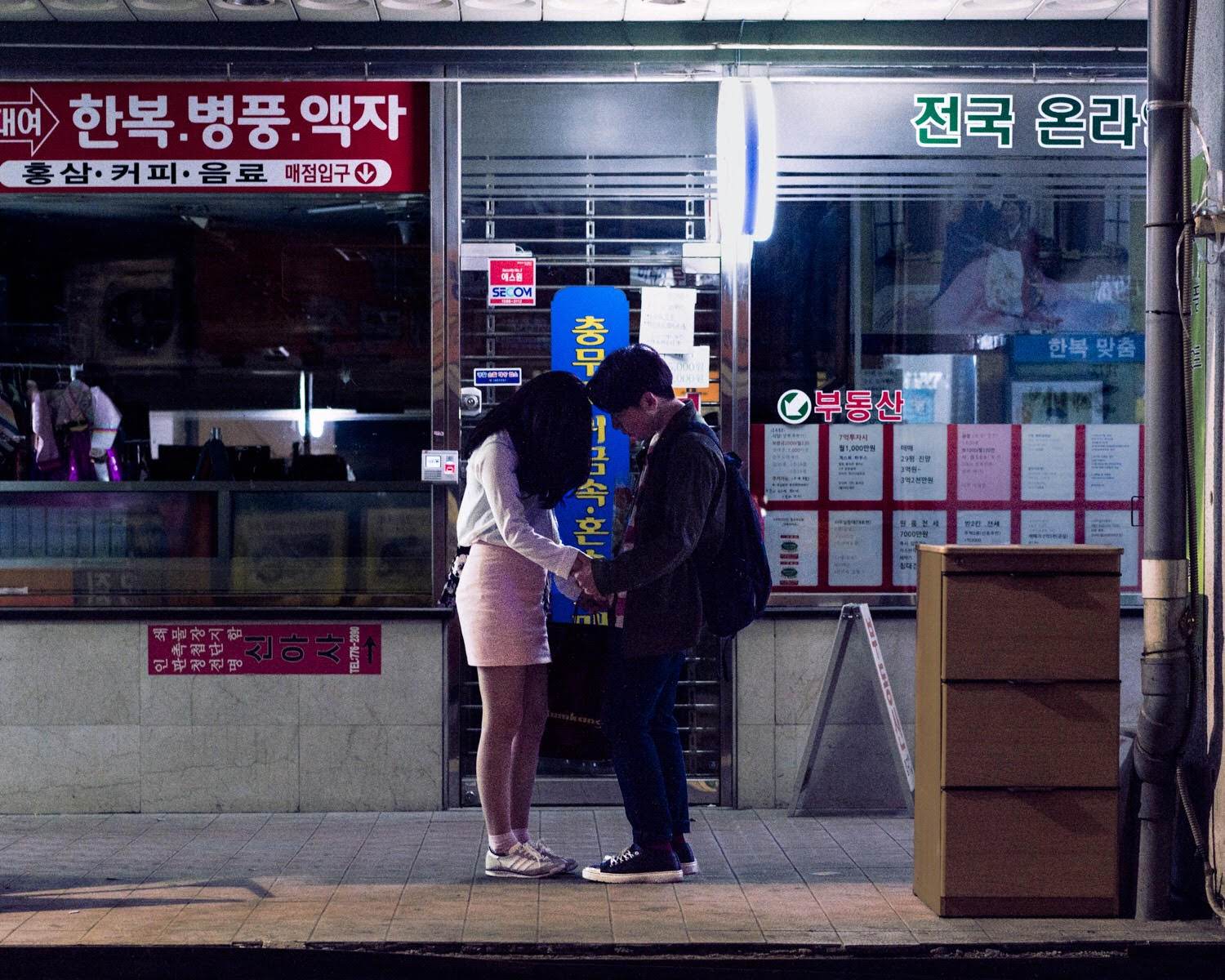
I see a lot of couples and kissing and intimacy portrayed in your photographs. Will this be your life work then: to portray Asians in love?
I think that’s what ties us all together as humans: we’re all lonely and looking for love, we’re all lost puppies. I always gravitate towards people who want to be in love or are in love. For some reason, the universe brings me to them.
What are some of your favorite scenes to photograph?
When I was living in Seoul, I lived on this big hill. One night I hear this couple talking outside and so I go upstairs and sit on the roof to try to figure out what’s going on. I realize they’re breaking up! So I go and take pictures of their break up. I think watching a break up in public is one of the most thrilling things in the world, because you can relate to another human being on the basest level of “I know what it feels like to get my heart broken! I feel you!” Watching a breakup is watching two people on the fringes of happiness and depression.
Even in Taipei, all these couples are riding around on scooters, hugging each other, and part of it is: I want that! I have that now, I’m married, I have a wife and we’re happy, and I want all these things with her! I want to learn how to ride a scooter so we can ride around Taipei and she can hug me from behind.
I think my generation grew up so obsessed with this idea of imagery and the idea of how we would look within movies. We grew up in the era of the rom-com. We go: “Oh my God, I want somebody to say that beautiful shit that Harry says to Sally!” We’re so obsessed with that. Our idea of romance is so fucked up because of the 90s, because we want these ultra-romantic gestures. I always see myself within a romance. My wife gets really annoyed at it, she says, “Dude, we’re not in a movie.” This is why I love her, because she’s such a realist. I gravitate towards romantic imagery because that’s what I grew up with, it’s what I’m interested in. In photography there’s 2 different schools. There’s the decisive moment school and the indecisive moment school. The decisive moment is simply a fact, like a guy scores a touchdown. I’m in the indecisive moment school. It’s the moment I described earlier of the photo Araki took of his wife, sitting on a train, where nothing’s going on, but you see this nakedness. I’m looking at it and my mind is running a million miles a minute, thinking about the moments like that I’ve had in my past, who I’ve had it with.
That’s the kind of potency I want to show: a potency in a moment, where emotionally, we can go anywhere, but it’s up to you to decide. I’m one of those assholes that likes open ended movies.
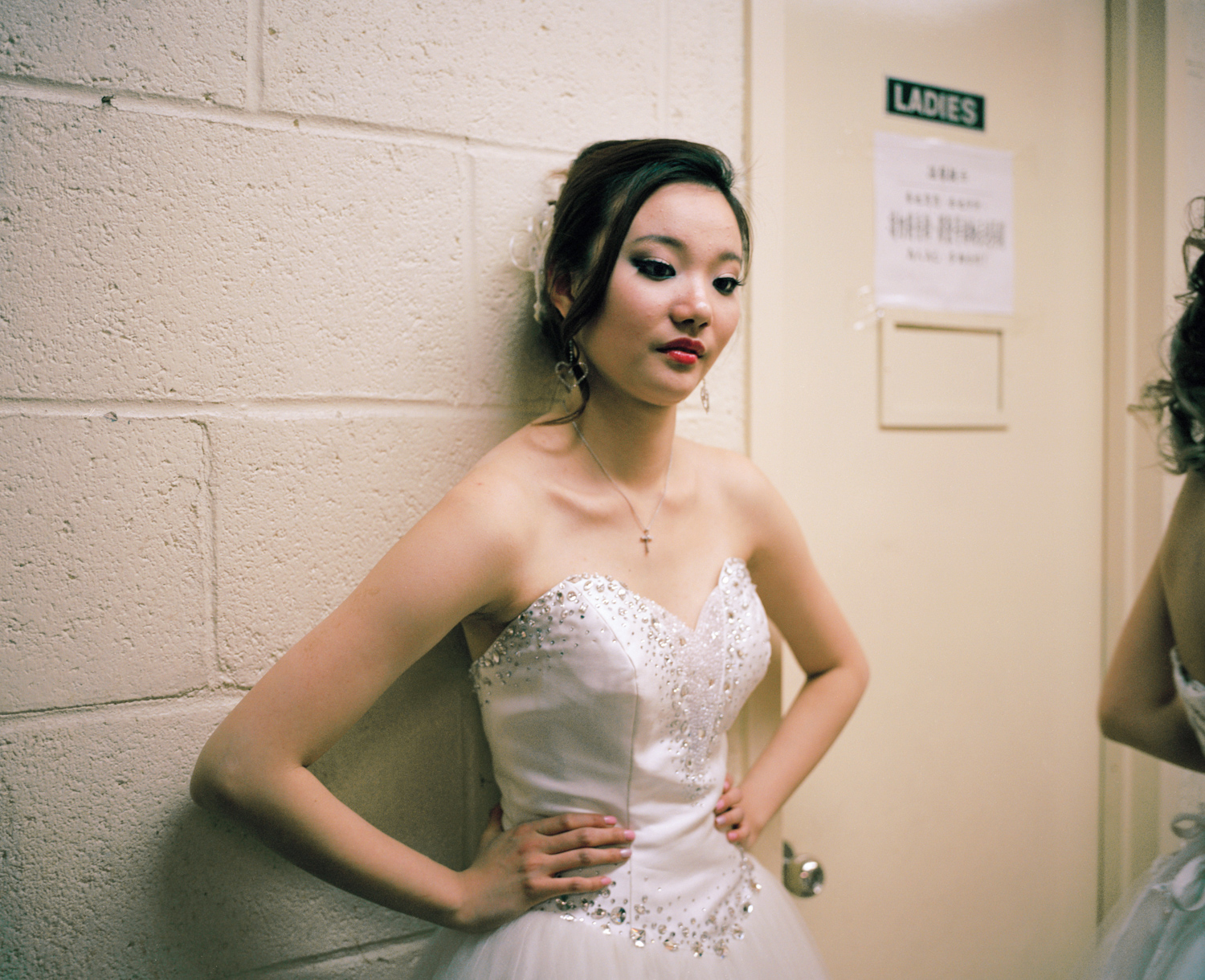
Do you think dating and romance is hard in New York?
New York’s a really romantic city. There’s physical love, there’s emotional love. I think nowadays the dating scene is a revolving door for a lot of people, but I think that just the fact that you’re willing to put yourself out there and try to love, is an act of defiance. We’re told to believe certain things, dating is shown a certain way in movies, but if you’re out here putting yourself out there, trying to fall in love with someone, to me that’s beautiful. If I see it I’ll photograph it.
And by love I don’t just mean romantic love. I also mean love between a mother and a son, a grandfather and his granddaughter.
What’s your favorite spot in New York?
[Laughs] I’m hesitant to talk to you about the 7 train because then everyone will rush on.
Get on the 7 train at around 4pm from Times Square all the way to Flushing. Experience how many different people are on that train, experience how many different languages are on that train, experience how the light looks on this train. The sun’s coming in, it’s beaming—even though the train system is horrible here—the 7 train, at this time of the day, feels like you’re in a movie. The light shines on one person differently as it goes, and you get fascinated by this. It’s my favorite thing.
